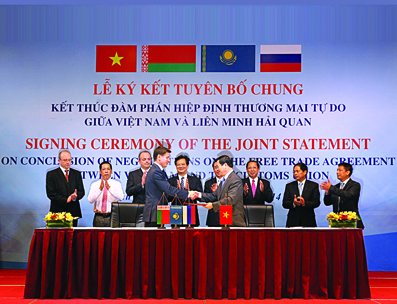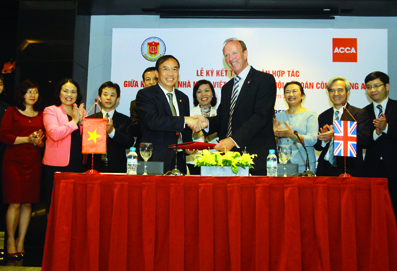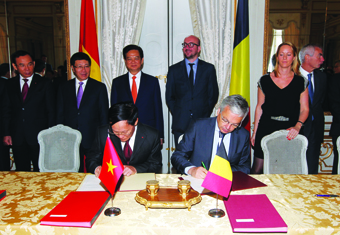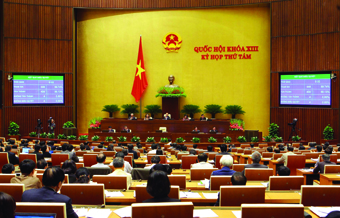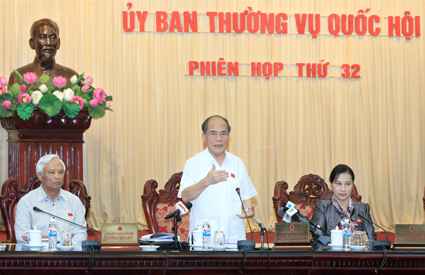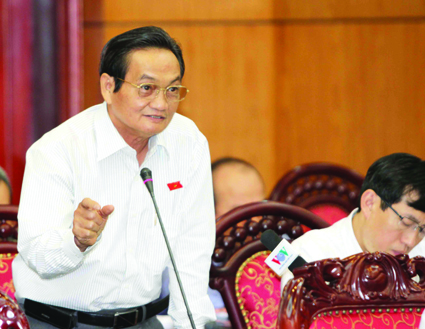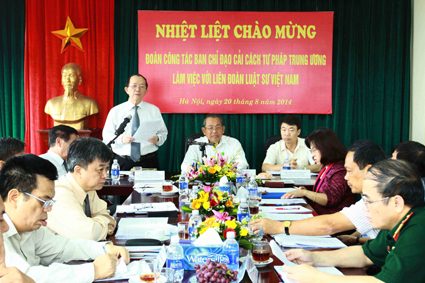The year 2014 is the first year of implementing the new Constitution with many new provisions on the operation of the National Assembly. Vice Chairman of the National Assembly Uong Chu Luu grants Vietnam Law and Legal Forum an interview about legislative and external relation activities of the National Assembly in 2014 as well as orientations for 2015.
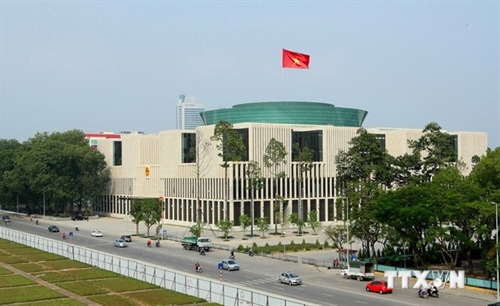 |
| The new parliament house in Doc Lap street, Hanoi__Photo: Pham Kien/VNA |
In 2014, the National Assembly passed a total of 29 laws and 11 resolutions, of which 18 laws were adopted at the 8th session - the highest number ever recorded. Could you brief on prominent results of legislative work in the last year, especially in the revision of the legal system in light of the new Constitution?
Legislative work is always regarded as a focus in the operation of the National Assembly, especially in 2014, the first year of implementing the new Constitution. It is also regarded as one of strategic breakthroughs toward creating socialist-oriented market economy institutions, building a law-ruled socialist state that respects, guarantees and protects human rights and citizens’ rights, carrying on judicial reform, strengthening national defense and security and pushing the international integration process in the spirit of the new Constitution. In 2014, an impressive number of laws were discussed and passed, reflecting a strong renewal in the National Assembly’s legislative work. Many of these laws are related to human rights, fundamental rights and obligations of citizens, further improvement of economic institutions, organization of the state apparatus, administrative and judicial reforms, education and training renewal, vocational training, science and technology and environment, assurance of social welfare, national defense, security and social order and safety, and promotion of international integration.
The National Assembly timely revised the Investment Law and the Enterprise Law toward guaranteeing the freedom of enterprise and equality among businesses of all economic sectors and specifying prohibited or restricted business sectors and trades, thus ensuring publicity and transparency.
The National Assembly also amended tax regulations, aiming to remove difficulties for businesses while ensuring state budget revenues.
The National Assembly revised regulations concerning institutions of the state apparatus. The amended Law on Organization of the National Assembly was passed with many new contents on the composition and standards of National Assembly deputies, aiming to assure that the National Assembly is really the highest representative body of the People and the highest state power body of the nation. The Law also contains provisions designed to improve the operations of the National Assembly Standing Committee, the Ethnic Council, Committees of the National Assembly and National Assembly deputies, especially full-timers. The Law on Organization of People’s Courts and the Law on Organization of People’s Procuracies have been overhauled for the purpose of building an independent and upright judiciary. The role of People’s Courts as judicial bodies empowered to exercise the judicial power has been affirmed. The principles of adversary procedures, judges’ independence during trial and guarantee of the right of the accused and defendants to a defense and the right of involved parties to protect their lawful interests have been concretized. The People’s Procuracies’ power to prosecute and supervise judicial activities enshrined in the Constitution has been specified.
The National Assembly also gave its initial opinions on the draft revised Law on Organization of the Government, the draft Law on Organization of Local Administrations and draft amendments to the Law on the State Audit Office - which are all important institutions of a law-ruled socialist state.
According to its 2015 law- and ordinance-making program, this year the National Assembly will pass a total of 30 draft laws. So, what are the focuses of legislative work in 2015?
Since 2015 is the final year of the XIIIth National Assembly’s tenure, the law- and ordinance-making program of the whole term must be basically completed. This means that the National Assembly will have to work on a large number of drafts. At the 9th session in May, lawmakers will pass 12 draft laws, adopt a resolution on the 2016 law- and ordinance-making program and discuss 15 other bills. Later at the 10th session in October, legislators will vote on 16 draft laws and give opinions on 11 others.
The first focus in legislative activities in 2015 is to expeditiously revise or pass the laws on organization of the state apparatus. Specifically, the National Assembly will consider and pass the revised Law on Organization of the Government, the Law on Organization of Local Administrations, the amended Law on the Vietnam Fatherland Front, the amended Law on Election of Deputies to the National Assembly and People’s Councils, and the revised Law on Promulgation of Legal Documents, among others.
The second focus is to boost the development of the socialist-oriented market economy. In light of this, the National Assembly will pass or give its opinions on the Law on the State Budget, the Law on the State Audit Office, the Law on Charges and Fees and the Law on Property Auction.
The third target is to improve the legal system concerning human rights, citizen’s fundamental rights and obligations and judicial reform through revising the Civil Code, the Civil Procedure Code, the Penal Code, the Criminal Procedure Code, while developing new laws such as the Law on Administrative Procedures, the Law on Referendum, the Law on Demonstrations, and the Law on Access to Information.
In early January, the Government launched a nationwide campaign to collect public opinions on the draft revision of the Civil Code. Could you brief on major objectives of the revision as well as the importance and great impacts of the Code on people’s life?
The Civil Code is a particularly important code governing all fundamental social relations in the civil sphere and directly affecting all civil activities of organizations, individuals and families. The revision of the Civil Code aims not only to remedy shortcomings of the current Code and problems arising in the course of implementation, but also to meet socio-economic development requirements and manifest, protect and promote fine cultural values and traditions of the nation. The revised Civil Code must become a general law of the legal system governing civil, economic and commercial relations, contributing to ensuring the stability and sustainability of social relations on the basis of inheriting and developing the existing civil code.
The revision of the Civil Code must be in line with the Party’s Political Platform and Socio-Economic Development Strategy, the Constitution and treaties of which Vietnam is a member. Besides, the revised Code must reflect national cultural traits and fine customs and traditions and encompass future socio-economic developments.
In order to ensure feasibility of the revised Code, the National Assembly has decided to publicize the draft version of the Civil Code for public opinion. Any revision, addition to and annulment of provisions of the current Code must be carefully considered and clearly explained so as to take advantage of the entire people’s collective intelligence in the formulation of the Code, serving as the basis for the National Assembly to consider and decide.
Could you tell us about external relation activities of the National Assembly in 2015?
Last year, in light of the 2013 Constitution, the National Assembly renovated its diplomatic activities in various aspects. The National Assembly’s bilateral diplomacy was developed toward further enhancing and deepening the cooperative relationships between Vietnam’s National Assembly and foreign parliaments, giving priority to partners of special friendship, neighboring and regional countries as well as strategic and traditional partners; increasing the understanding and seeking the support of foreign parliaments and, at the same time, reducing misconceptions about the situation in Vietnam. Multilateral diplomacy was further promoted on the principle of activeness, proactiveness and responsibility so as to consolidate the Vietnamese National Assembly’s role at regional and international inter-parliamentary forums under the motto that Vietnam is a friend, a reliable partner and a responsible member of the international community.
Together with external activities of the Party, in 2014, parliamentary diplomatic activities have made a very important contribution to the safeguard of national independence, sovereignty and territorial integrity and maintenance of a peaceful and stable environment for development.
In 2015, the National Assembly will carry out its external activities with the following key tasks:
The first task is to promote the role of parliamentary diplomacy as part of the State’s diplomacy; to continue combining parliamentary diplomacy with external activities of the Party and the State and people-to-people diplomacy to implement the foreign policy of independence, self-reliance, peace, friendship, cooperation and development; to actively and proactively integrate into the international community; to increase external relation activities with parliaments of neighboring countries, strategic partners and partners whose support is important to Vietnam; to contribute to the protection of sovereignty over seas and islands and of national interests; to promote parliamentary lobbying with regard to the issues of democracy, human rights and religion; and to develop the cooperative relationships between Vietnam’s National Assembly and foreign parliaments to be intensive, effective and practical.
The second task is to highly concentrate on the organization of the 132nd Inter-Parliamentary Union (IPU 132) in March and bilateral activities on the sidelines of the event.
The third task is to promote legislative work to serve international integration in the spirit of the 2013 Constitution, especially the formulation and verification of draft laws and ordinances applicable to cases involving foreign elements, and agreements, pacts, conventions and treaties to be approved by the National Assembly.
The revised Law on Organization of the National Assembly was passed in late 2014 and will take effect in early 2016. What are crucial changes in the organization and operation of the National Assembly once this Law comes into force?
On November 20, 2014, with an overwhelming majority of deputies voting for, the National Assembly passed the revised Law on Organization of the National Assembly to replace the 2001 Law and its 2007 amendments. The Law has institutionalized the Party’s renewal line, concretized the 2013 Constitution’s provisions on the organization and operation of the National Assembly, and inherited and developed the current Law. It has been also formulated based on the selective absorption of parliamentary organization and operation experiences in other countries which are suitable to Vietnam’s conditions.
Compared to the current Law, the newly passed Law introduces a number of substantial changes to the organization and operation of the National Assembly.
First, the new Law devotes 16 articles to clearly defining the role, position, tasks and powers of the National Assembly corresponding to its three functions: exercising constitutional and legislative powers, deciding on important issues for the country, and conducting supreme oversight over activities of the State as enshrined in Article 69 of the Constitution. The Law also specifies the National Assembly’s competence to decide on the country’s major goals, targets, policies and tasks for socio-economic development; the state budget; and high-ranking state personnel. Besides, the Law has 13 articles dedicated to concretizing the National Assembly Standing Committee’s tasks and powers defined in Article 74 of the Constitution.
Second, the new Law determines and presents more clearly the position and role of National Assembly deputies as the center of parliamentary organization and operation. It sets more specific criteria for National Assembly deputies, increases the number of full-time deputies and specifies necessary conditions for deputies’ effective activities.
Third, the new Law revises provisions on the organizational structures of the Ethnic Council and Committees of the National Assembly and election and approval of their members in conformity with the 2013 Constitution. Accordingly, the Ethnic Council and Committees of the National Assembly each will have a head, deputy heads, standing members, full-time members and other members.
Important amendments have been made to provisions on the duties and powers of the Ethnic Council and Committees of the National Assembly: adding the power to submit draft laws or ordinances in domains under their charge and the responsibility to defend the Constitution as stated in Article 119 of the Constitution.
The Law also makes clearer activities of making reports and explanations on matters under the charge of the Ethnic Council and Committees of the National Assembly at their working sessions.
Last, on the basis of evaluating the work of the secretariat of National Assembly sessions and referring to international experiences in organizing parliamentary operations, the new Law introduces the title of National Assembly Secretary General in replacement of the session secretariat prescribed in the current law. The National Assembly Secretary General will be elected, dismissed and removed from office by the National Assembly. He will take charge of all activities serving operations of the National Assembly, the National Assembly Standing Committee and National Assembly deputies. He will also advise the National Assembly and National Assembly Standing Committee on their tentative working agendas. The Secretary General will concurrently act as the speaker of the National Assembly and National Assembly Standing Committee.
The Law on Organization of the National Assembly has demonstrated the principles and requirements of a law-ruled socialist state of the people, by the people and for the people, and reflected the role and position of the National Assembly as the highest representative body of the people and the highest state power body of the Socialist Republic of Vietnam. It serves as an important legal basis for further increasing the quality and effectiveness of the National Assembly’s activities.- (VLLF)
